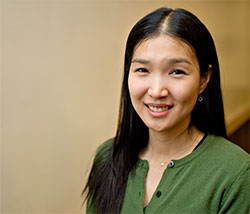A Citizen of the World
Who better to organize a conference on second language research than a Korean woman who speaks perfect English with a hint of an Indian accent?
That would be TC doctoral student Eun Sung Park, whose father, an irrigation engineer, took his family from Seoul when his daughter was in the fifth grade to go wherever the floods were -- primarily Bangladesh and Indonesia. Park learned to speak English in a remote mountain boarding school in the Tamil-Nadu section of India. These were the days before the development of ESL instruction, she says, so she essentially spent her entire seventh-grade year learning English, with virtually no content instruction. "I had maybe two classes in math a week and that was it," she says.
After completing her secondary education in schools throughout the developing world, Park enrolled, sight-unseen, at Mount Holyoke College. She found herself beset by constant culture shock.
This was 1987, and students there were very sheltered," she says. "We had nothing in common -' in India; I'd never even had a television."
Returning to Korea to work as a translator during the 1988 Olympic Games and then found herself on the other side of a cultural divide. Anti-U.S. sentiment was so strong at the time that even knowing English was frowned upon, so she didn't speak the language for seven years. Despite all this, she decided to give the U.S. another try, enrolling in a master's program at TC in 1994. The second time proved the charm. "New York City is so international that I fit right in," Park said.
Meanwhile, she's developed a love for teaching second languages to adults. "Adults are so motivated, and second languages are an important social and academic tool for them," she says. "If you don't know the language of the area you live in, you can appear to be rude or incompetent." After earning her master's degree, she went back to Korea to lecture at Sogang University and was featured on a Seoul radio program teaching beginner's English. "Language instruction for adults can be expensive, so this was a cheap way for a lot of people to get valuable instruction," she says. After some time at the university, she realized that a doctorate would help her be a more affective advocate for second language instruction, and came back to TC in 2000.
Published Wednesday, Dec. 21, 2005
